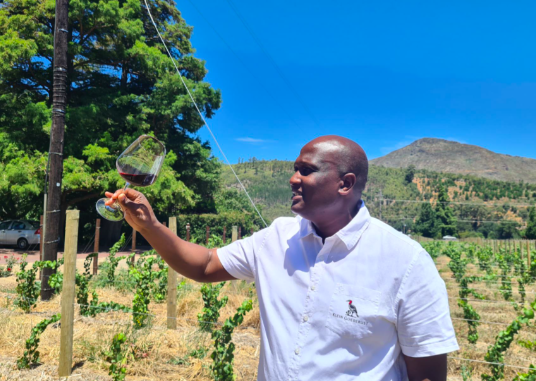Some 32 years after the end of Apartheid, a Black South African businessman has redeemed the legacy of his mother’s hard work under the segregationist system.
As a child, Paul Siguqa watched his mother labor in a white-owned vineyard close to the Cape Town wine lands on a Franschhoek vineyard.

Life after Apartheid
He grew up in a two-bedroom cottage with his mother and sister under apartheid that ended when he was 9 years old. His mother, Nomaroma Siguqa, who is now 71, shared with him something that he took with him for the rest of his life: Her generation would be the last in their family to work in those fields.
When his classmates, 43 of them who started with him in the first grade, had to drop out of school to work in the vineyards, his mother (whom he calls a “powerhouse of a woman”) told him to continue his studies.
As a teenager, he sold fruit on the side of the road to purchase his first car. He saved more to afford college at the Cape Peninsula University of Technology and the University of the Western Cape. He kept saving and planning until he accomplished his childhood dream — to fulfill the prophecy his mother spoke over the family.
Starting Wine Farm
Now the son of the farm laborer has become the first Black man to own a vineyard in the valley, restoring and opening the Klein Goederust Boutique Winery in Franschhoek, South Africa, according to the New York Times.
It took Siguqa 15 years to save up the money to make KGBW operational, but now it is the only fully Black-owned winery in one of the country’s two most prestigious wine valleys. This is a huge feat considering the statistics about Blacks participation in the winemaking industry.
Despite white South Africans being 8 percent of the population, they own almost 80 percent of the privately held farmland. Black South Africans, who are 80 percent of the population, only own about 2.5 percent of the country’s vineyard acreage, Vinepro reports.
Siguqa shared how challenging it has been for him to become successful in space, considering the country’s history of institutionalized racism, one that was set up to hinder the economic and social growth of indigenous, Black-skinned people.
Though the system came to a legislative end in 1990, the remnants of it continued to govern businesses and left “millions of Black South Africans are chronically short of capital needed to start businesses,” the Times also reported.
Challenges of Doing Business in South Africa
However, between 1998 and 2008, an approximate 3.5 percent growth per year in the national economy doubled the size of the South African Black middle class. Still, that could not compete with the more than 90 percent of national wealth attributed to the white majority that claimed property and land rights in the country dating back centuries. This has posed a mountain of challenges that seemed insurmountable to get over. But Siguqa has.
He explained his challenge, “We inherited nothing. Because we are first generation, everything starts with us. So, the burden’s a lot heavier.”
“If it’s possible for a child of an uneducated farm laborer to be a farm owner, then it’s possible for the child of a domestic worker to become a doctor, a scientist, and whatever that they want to be,” the entrepreneur continued.
The 41-year-old told Business Live, “You know, this is a dream come true, but I didn’t do this just for myself, I did this for those who must see there is life and hope beyond the farm wall.”
Siguqa revealed, “Farm workers knew nothing else than working in the vineyards and earning far too little. It is incredibly difficult being a farm worker and being a farm worker’s child.”
But now this child has created an enterprise that his mother could have only dreamed about, and to show homage to her he named the farm’s méthode cap classique (MCC) after her.
“She was very precise with what she wanted it to taste like, so we could only bottle it when she was happy,” he said before revealing the smooth-tasting MCC sold out immediately. “And it’s my mother. I would do anything to make her happy.”




